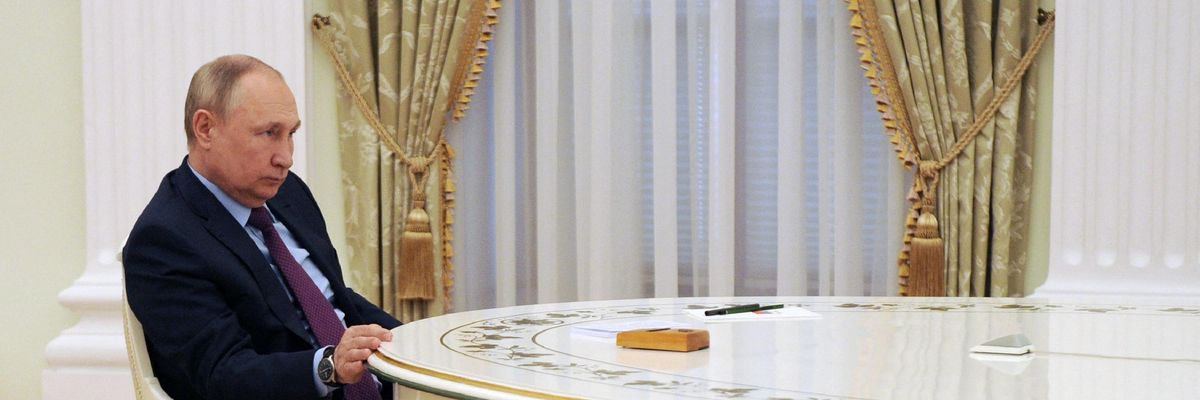Vladimir Putin's invasion of Ukraine has triggered a literal hunt by Global North nations for his and his cronies' ill-gotten financial assets. It has pushed USAID to announce a new global anti-corruption program aimed at expanding the capacity of investigative journalists and civil society to pursue reforms, and sift through big data dumps that are increasingly a critical source of the financial flows and evidence both sanctions officials and bank regulators need.
While all eyes are on #YachtWatch and the pursuit of Russian oligarchs, there's another major development with ramifications for Putin's corruption. On Friday, the Financial Action Task Force, an intergovernmental anti-money laundering and illicit financing organization, added the United Arab Emirates to its money laundering "gray list" -- a major reputational hit to the UAE as a responsible partner.
Despite Emirati government officials fawning over the country's ongoing commitments to working with FATF, being placed on the "gray list" flies in the face of Dubai's projected image of a low-risk "business-friendly" environment -- and the ratcheting up of international sanctions against oligarchs, terrorists, and other crime bosses stationing their assets in Dubai only creates more risk. Being added to the list also means increased scrutiny and monitoring of its implementation of the actual policies the UAE appears to have quickly stood up in response to eyebrow-raising revelations about Dubai's role as a central hub for blood money laundering, terror financing, and offshoring ill-gotten gains.
This monitoring will be essential to determining whether these commitments to FATF create meaningful steps toward ending Dubai's role as a major global tax haven, or if it will merely represent more window-dressing to cover up systemic governance deficiencies essential to maintaining autocratic rule. Jodi Vittori and Matthew T. Page, two anti-corruption and security scholars at the Carnegie Endowment for International Peace documented how essential corruption is to the UAE's overall political economy, that it is "a feature, not a bug of Dubai's political economy."
Corruption, tax havens, money-laundering (in its many, many forms), anonymous shell companies, and human trafficking all flow through Dubai, but it's not like it (just like North Dakota, Switzerland, and Delaware) is an "unknown" real estate tax haven or money-laundering hub. Recall the Emirates and other Gulf Cooperation Council countries' (along with Western banks') reported 2009-12 assistance in laundering billions in wealth from the Malaysian people through their respective sovereign wealth funds.
So what does this have to do with Russia? The UAE is one of the few safe havens for Russian oligarchs and their wealth that remains. It's also no coincidence that the Emirati monarchy's strategy (in lock step with Saudi Arabia) remains having their cake and eating it too. The monarchy wants to remain silent on Putin's illegal invasion -- after signing up, two years ago, for billions in investment by the very companies the United States and its transatlantic allies are (continuing) sanctioning, while also promising it is a safe place to do business and the viable ally most of Washington has gaslighted itself into believing it is. That's why the FATF designation is so important: it is one of the first times in recent memory that an international body has placed credible pressure -- and a semblance of potential financial accountability -- on the UAE to implement meaningful reforms, such as proof that it is actually reforming the way it carries out investigations and prosecutions among other required transparency measures.
The reality is that Dubai has only been "low risk" so long as the Emirates have been able to keep up the farce that its allyship is worth more than the benefits of accountability. Just as addressing Putin and his cronies' corruption, and the power it inures, requires elites in the United States to address their own corruption; undermining the influence of war criminals, crime bosses, and oligarchs globally requires the United States to hold any country it claims to be an "ally" accountable for enabling these abusers no matter their nationality.
Thanks to Washington and the rest of Europe's two-decades-long obsession with counterterrorism, however, accountability has been a scarce concept in U.S. bilateral relationship with the Emirati monarchy no matter what party controls the U.S. government. The refrain has often been that human rights abuses, up to and including torture, must be downplayed in the name of preserving intelligence-sharing, or ill-defined leverage that will never actually be deployed.
Instead, the UAE has made it a practice to instill an image of itself as "Little Sparta" within Washington, primarily by massive donations to think tanks, political campaigns, and employing former U.S. military officers, including a former Secretary of Defense James Mattis, as training advisers. The real story, no matter the international image it projects, is one of the UAE hiring former U.S. military members and members of the genocide-committing Sudanese Janjaweed militia as paid mercenaries in Yemen. It has waged numerous operations in Washington to influence both federal policy and U.S. elections, and it has a critical counter-revolutionary force acting to (often violently) thwart people-powered movements for dignity and justice throughout the region.
If Washington is serious about actually undermining the ability of oligarchic elites to hold the world hostage, whether through nuclear weapons, oil prices, or the offshoring of wealth that exacerbates unprecedented levels of global inequality, it must get serious about not only cleaning up its own side of the street, but any country it credibly claims as a critical partner or ally. Otherwise, oligarchs and the autocratic strongmen who speak for them will continue to reign in a shadow world of impunity that U.S. foreign policy fuels, rather than counters.

